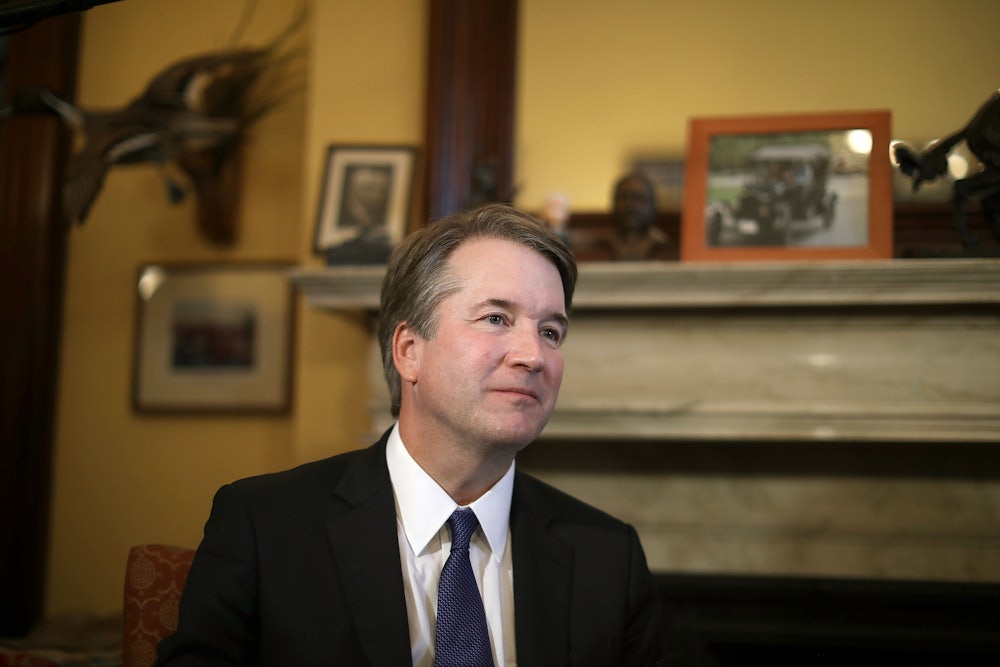President Donald Trump’s announcement on Monday that he’d nominated Brett Kavanaugh to replace retiring Supreme Court Justice Anthony Kennedy prompted rampant speculation about the future of Roe v. Wade. There was less talk, however, about Massachusetts v. EPA.
The latter ruling, which The Atlantic recently called “the most important court case in U.S. climate law,” is the reason the Environmental Protection Agency has the legal authority to regulate greenhouse gases. The Clean Air Act of 1970 requires the government to regulate air pollution—in fact, the EPA was created to implement those requirements—but in 2003 the Bush administration insisted that the law didn’t compel it to regulate greenhouses gases such as carbon dioxide. Massachusetts and many other states and cities disagreed, and sued.
When the case reached the high court, the justices narrowly ruled that greenhouse gases were indeed pollutants. Kennedy was the deciding vote, joining the court’s four liberal justices. Now, with Kavanaugh set to replace Kennedy, conservatives may have the votes to overturn that precedent.
“Just like the future of Roe v. Wade, the future of federal action to rein in climate change should be a huge issue in [Kavanaugh’s] confirmation hearing,” said Abbie Dillen, the vice president of climate litigation at Earthjustice.
Kavanaugh, a 53-year-old judge for the D.C. Circuit Court of Appeals, is “pretty consistently anti-environment on every front,” Center for Biological Diversity senior counsel Bill Snape told BuzzFeed News. That includes the issue of greenhouse gases. Kavanaugh “will not be afraid to say that greenhouse gases don’t fall into the category of pollutants the [Clean Air Act] was supposed to address,” said Brendan Collins, an environmental litigator at Ballard Spahr LLP who has argued before Kavanaugh. “He maintains a level of discomfort of anything he regards as a reach, authority-wise, from the EPA.”
In a 2012 case, for instance, Kavanaugh rejected the EPA’s authority to create a greenhouse gas permitting program. “The task of dealing with global warming is urgent and important,” he wrote. But, he added, “As a court it is not our job to make policy choices.”
Overturning Massachusetts v. EPA has long been a dream of conservatives because the decision was the impetus for the EPA’s 2009 rule—known as “the endangerment finding”—stating that climate change is hazardous to human health and must be regulated. That rule is the main reason the Trump administration can’t simply eliminate every climate regulation President Barack Obama put in place during his tenure. Overturning Massachusetts v. EPA would thus make it easier for Trump’s EPA to do away with the endangerment finding, and create a glide path for gutting air pollution regulations. That prospect “could not be more alarming,” Dillen said. “We need every possible tool to address climate change. We’re running out of time.”
The elimination of the endangerment finding has long been considered improbable, if not impossible, given the makeup of the Supreme Court, the existing legal precedent of Massachusetts v. EPA, and the reluctance of the EPA administrator to challenge it. Two of those realities, however, have now changed. Not only is Kennedy gone, but coal lobbyist Andrew Wheeler has replaced Scott Pruitt as head of the EPA.
Wheeler did say last week that he considers Massachusetts v. EPA settled law: “There would have to be a major, compelling reason to try to ever reopen that.” But he’s been critical of the decision in the past, and some say he could be more effective than Pruitt if he did decide to repeal the endangerment finding. “The difference may lie in Wheeler’s long experience in Washington, D.C.,” Dillen said. “He may have a more focused attention to coal issues since he’s been a coal lobbyist for much of his career.”
Vermont Law School professor Patrick Parenteau is less convinced that anything has changed. “I don’t think [Massachusetts v. EPA] is in any jeopardy,” he said, adding that Chief Justice John Roberts has previously said he doesn’t feel it’s necessary to revisit the decision. “They just don’t seem to have the appetite for that. Even Wheeler—everything I’ve seen has indicated that they’re reluctant to take that on.” Collins, too, expressed skepticism. “There’s always a tendency to overstate the degree to which people are interested in tearing up established law,” he said. “There’s a strong tendency, frankly, under the Roberts Court to leave in place established case law unless there is some clear call to make a change.”
Even if Massachusetts v. EPA itself isn’t at risk, however, Kavanaugh’s confirmation could lead the Supreme Court to weaken the EPA’s authority to create aggressive climate regulations under the Clean Air Act. Trump’s EPA is expected soon to release a weaker version of the Clean Power Plan, Obama’s signature regulation to fight global warming, and it “will inevitably take a very narrow view of EPA’s authority to regulate greenhouse gases under the Clean Air Act,” Dillen said. The new rule is also certain to get challenged in court, eventually giving the Supreme Court an opportunity to rule on the Trump EPA’s more narrow interpretation.
It’s frustrating to environmentalists that such important decisions often lie with a group of nine men and women. But the Supreme Court’s power on environmental issues stems from Congress’ repeated refusal to pass legislation giving the government clear authority to fight climate change. Now, the future of greenhouse gas regulation is in the hands of Chief Justice Roberts, who could well change his mind about revisiting Massachusetts v. EPA. If that happens, Parenteau noted, “five votes is all it takes.” And Kavanaugh would surely be one of them.
